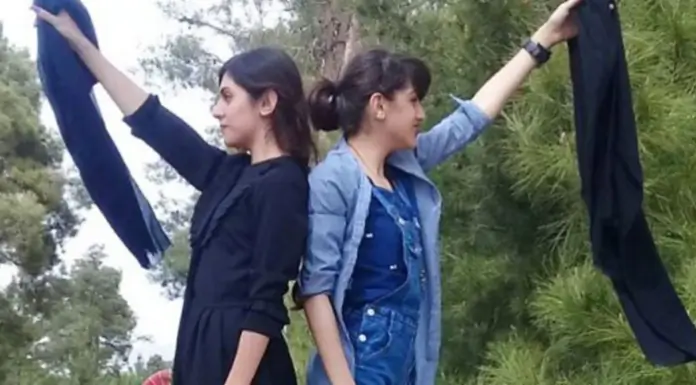1,700 Iranian women were summoned in Iran for the improper wear of the Islamic hijab since the beginning of the Iranian year in late March. This comes as Iranian women this week took to the streets to protest the Islamic Republic's hijab policy and lack of women's rights, uncovering themselves in public to protest against the regime’s human rights violations, specifically the treatment of women.
According to the Iranian state-run website, Tabanak, Ali Akbar Javidan, the Chief of Police in Kermanshah stated that those who do not observe the hijab laws and refuse the summons would face severe consequences. Javidan claimed that the hijab's observance was one of the most sacred demands of the people, explaining that several systems are directly involved in Kermanshah, with several indirectly active in the area. Police officials have been handing out warnings to around 20,000 citizens, charging them with violations of moral security and hijab observance.
The Police Chief added that around 230 cars faced impoundment during the same time for "cruising on the streets," violating city law.
He further stated that police surveillance on historical, recreational, commercial centers, travel agencies, restaurants, cafes, and tourist areas had increased. He explained that such surveillance measures allow police officials to monitor civilians more closely and respond appropriately to violations. According to reports, this new "surveillance plan" will help police officials target women speaking out against the Islamic regime and uncovering themselves in protest.
Javidan explains that if an individual violates the law for the first time, they will receive a warning. However, if an individual repeatedly breaks the law, they will be summoned to the Kermanshah moral security police and sign a commitment to uphold Islamic law. Regarding those who refuse a summons after 10 days, the Chief of Police explained that they will lose their car and face other severe consequences.
The Iranian official also included a new ban on dog walking in Kermanshah, citing it as a punishable offense. According to the new law, if police officials witness a citizen walking his or her dog, the dog will be handed over to city officials and be kept in special centers designed for animals. If the same individual continues to repeat such actions a judicial case will be filed against them, and they will face the consequences.
Since its inception in 1979, the Islamic Republic of Iran has subjugated Iranians through its radically based Islamic Sharia laws. Under the ayatollahs, the regime has poured millions of dollars into the coffers of Islamic officials, the Revolutionary Guards Corps (IRGC), and police and security forces to suppress citizens for speaking out against the Islamic government and violating any laws that go against Quranic teachings. The regime has been able to maintain its Islamic dictatorship and laws thanks in part to the ayatollahs’ radical Shiite supporters, who make up the country's morality police, targeting and monitoring citizens on behalf of the government.
When protests against the regime occurred in 2009 and 2018, Supreme Leader Ali Khamenei responded by sending police forces to arrest and kill peaceful protesters, claiming that they were foreign agents sent to overthrow the government and destroy its religious foundations.
With the current radical hardline President Ebrahim Raisi in power, the Islamic Republic has continued to enact increasingly Islamic laws against its citizens. Raisi and his government have continued the regime's longstanding policy toward executions of individuals imprisoned for voicing opposition toward Islam and continuing arrests of protesters and young Iranians for expressing themselves freely.
In early July, Raisi sent an order to security officials to enforce the country's hijab and chastity, resulting in a new list of restrictions on how women can dress and interact in public. The order prohibited female employees in Iran's private and public sectors from wearing high-heel shoes and stockings and forbade male managers from having women as administrative assistants. In response to Raisi's orders, Iranian women took to the streets to protest the government's new policies, uncovering themselves in public and posting their activities without the hijab on social media for the world to see.
The Islamic Republic is currently engaged in ongoing negotiations with the West over its nuclear program, hoping to come out of the talks with economic sanctions relief and other benefits to support the regime. With Iran continuing to enrich its uranium supply to weapons-grade level and demanding more economic sanction relief than what was offered in the previous 2015 agreement, Western officials have continued to have frustrations with Iranian officials. The various setbacks in the negotiations have left many officials unsure if a deal will come.










